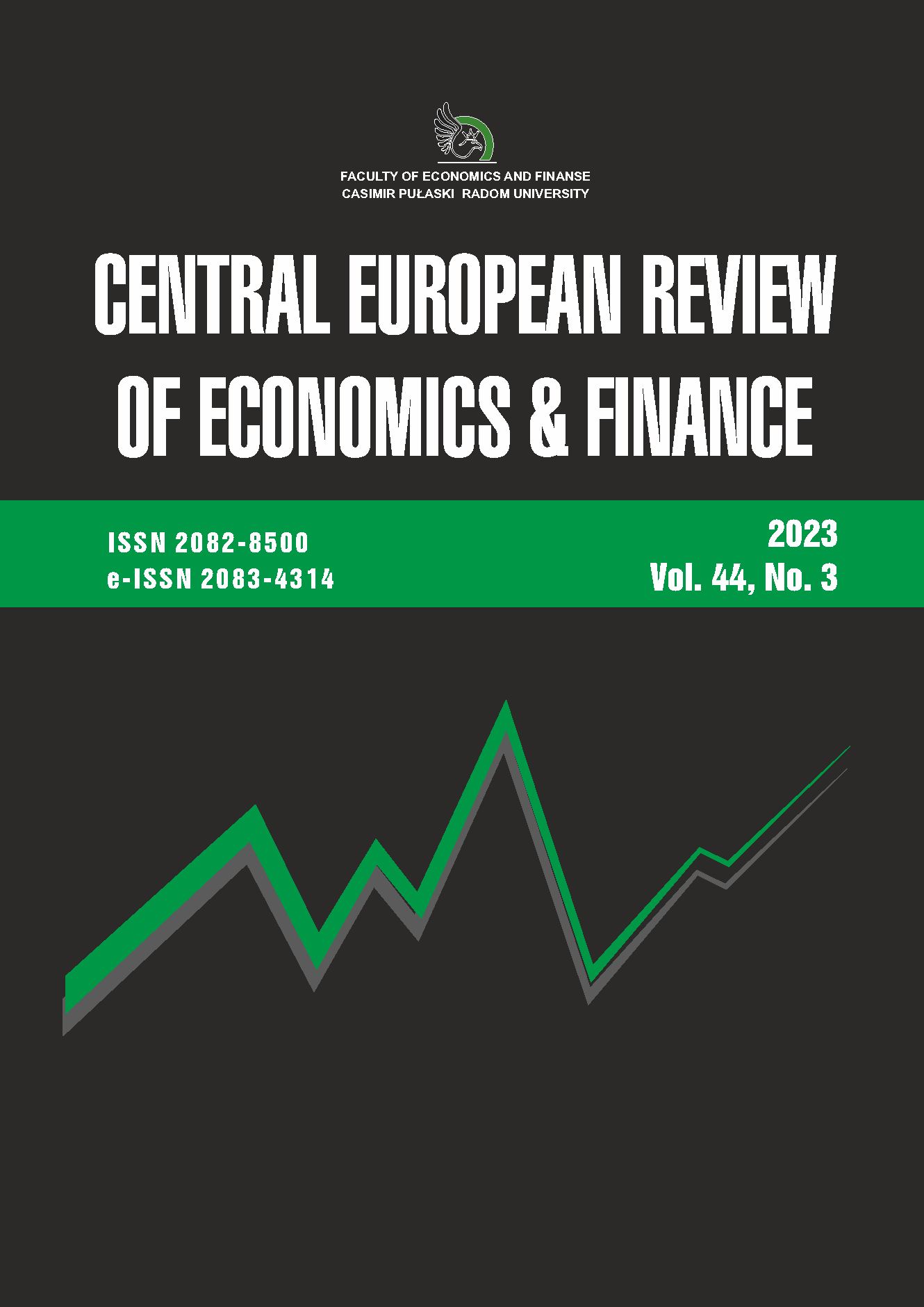Switzerland-EU Relations – between economic integration and bilateralism
DOI:
https://doi.org/10.24136/ceref.2023.012Keywords:
Common Commercial Policy, the European Union, trade agreements, Switzerland-EU relations, economic integration, bilateralismAbstract
Switzerland’s foreign policy priorities include, among other things, relations not only with neighbouring countries, but also with the EU. Being a country which is located in the heart of Europe, Switzerland considers the relations with the European Union (EU) and its Member States to be of special importance. The paper aims to present mutual relations between Switzerland and the European Union over the past years, demonstrate benefits and threats arising from Switzerland’s decision to choose, as the only one of all third countries, a path of “bilateral agreements”, as well as describe possible scenarios for mutual relations following the rejection of an institutional agreement, which was expected to put that relationship on a new path. The strategy of bilateralism brings many bene fits to Switzerland. However, due to the firm position of the EU, it will be necessary to look for new scenarios for the development of mutual cooperation. Perhaps such a solution would be to renegotiate the free trade agreement with Switzerland and turn it into a next-generation trade agreement.
Downloads
References
Abkommen vom 21. Juni 1999 zwischen der Schweizerischen Eidgenossenschaft einerseits und der Europäischen Gemeinschaft und ihren Mitgliedstaaten andererseits über die Freizügigkeit (SR 0.142.112.681), https://www.fedlex.admin.ch/eli/cc/2002/243/de [Access: 10.01.2023].
Abkommen zwischen der Schweizerischen Eidgenossenschaft und der Europäischen Gemeinschaft über bestimmte Aspekte des öffentlichen Beschaffungswesens (SR 0.172.052.68).
Agreement between the European Community and the Swiss Confederation on trade in agricultural products – Final Act – Joint Declarations – Information relating to the entry into force of the seven Agreements with the Swiss Confederation in the sectors free movement of persons, air and land transport, public procurement, scientific and technological cooperation, mutual recognition in relation to conformity assessment, and trade in agricultural products, OJ L 114, 30.4.2002, 132–368.
Basic Facts on the Framework of EU-Switzerland Relations, 2021, https://www.eeas.europa.eu/sites/default/files/str_ifa_euswitzerlandrelations_ factsheet_final.pdf [Access: 11.01.2023].
Bilaterale Abkommen i Schweiz-EU: Erste Erfahrungen ein Jahr nach Inkrafttreten,http://www.admin.ch/cp/d/3ed37670_2@presse1.admin.ch.ht ml [Access: 28.12.2022].
Calliess, Ch., (2008), Die Privilegierte Partnerschaft der Schweiz als Modell für die Erweiterungsfrage der EU, Schriftenreihe des Arbeitskreises Europäische Integration e.V. 61, Nomos Verlag, Baden Baden, 283-306.
Europa, (2015), Interinstitutional File 2015/0075 (NLE), 2015/0076 (NLE), https://data.consilium.europa.eu/doc/document/ST-8297-2015-INIT/en/pdf
Europabericht, (2006), https://www.admin.ch/ch/d/ff/2006/6815.pdf [Access: 12.01.2023].
European Commission, (2021), Basic Facts on the Framework of EUSwitzerland Relations, https://www.eeas.europa.eu/sites/default/files/str_ ifa_eu-switzerlandrelations_factsheet_final.pdf [Access: 12.01.2023].
European Commission Trade Statistics, (2022), http://ec.europa.eu [Access: 29.12.2022].
Fedlex, (2022), EU Sectoral Agreements (in German), https://www.fedlex.admin.ch/de/sector-specific-agreements/EU-actsregister [Access: 11.01.2023].
Integrationsbüro EDA/EVD, (2008), Bilaterale Abkommen Schweiz Europäische Union, Bern.
Kozłowski, S., (2015). Ewolucja stosunków między Konfederacją Szwajcarską i Unią Europejską: strategia bilateralizmu w impasie, Studia Europejskie, no. 3, 57-76.
Kozłowski S., (2010), Strategia bilateralizmu w polityce Konfederacji Szwajcarskiej wobec Unii Europejskiej, Studia Europejskie, no. 4, 116-136.
Kozłowski S., (2011), Uprzywilejowane partnerstwo w stosunkach z Unią Europejską na przykładzie Konfederacji Szwajcarskiej, Athenaeum. Polskie Studia Politologiczne, vol. 28, 28-42.
Kux S., Sverdrup U., (2000), Fuzzy Borders and Adaptive Outsiders: Norway, Switzerland and the EU, European Integration, vol. 22, 237-270, https://doi.org/10.1080/07036330008429087.
Meier, U. (2021). Maschinenrichtlinie: Änderung der Liste der harmonisierten EN-Normen – Swissmem, https://www.swissmem.ch/de/aktuelles/ detailansicht/maschinenrichtlinie-aenderung-der-liste-der-harmonisiertenen- normen-2.html [Access: 13.01.2023].
Mueller S., Heidelberger A., (2019), Should We Stay Or Should We Join? 30 Years of Sovereignism and Direct Democracy in Switzerland, European Politics and Society, vol. 21, no. 2, 182-201, https://doi.org/ 10.1080/23745118.2019.1632582.
Oesch M., (2020a), Schweiz – Europäische Union. Grundlagen, Bilaterale Abkommen, Autonomer Nachvollzug. EIZ Publishing, Zürich, https://doi.org/10.36862/eiz-297.
Oesch M., (2020b), Switzerland-EU Bilateral Agreements, the Incorporation of EU Law and the Continuous Erosion of Democratic Rights, Yearbook of European Law, vol. 39, 602-639, https://doi.org/ 10.1093/yel/yez005.
Overton S., (2021), EU-Switzerland Negotiations on a Framework Agreement, https://ukandeu.ac.uk/explainers/eu-switzerland-negotiationsagreement/ [Access: 15.01.2023].
Popławski D., Starzyk-Sulejewska J., (2012), Outsiderzy integracji europejskiej. Szwajcaria i Norwegia a Unia Europejska, Wydawnictwo Naukowe Scholar, Warszawa.
Porębski A., (2021), “Foreigners” in modern Switzerland. Immigration issues in federal popular votes after 2000, Journal of Modern Science, TOM 1/46, 269-286, https://doi.org/10.13166/jms/139661.
Regulation (EEC) No 2840/72 of the Council of 19 December 1972 concluding an Agreement between the European Economic Community and the Swiss Confederation and adopting provisions for its implementation and concluding an additional Agreement concerning the validity, for the Principality of Liechtenstein, of the Agreement between the European Economic Community and the Swiss Confederation of 22 July 1972, OJ L 300, 31.12.1972, p. 188-188.
Schwok, R., (2020), Switzerland-EU Relations: The Bilateral Way in a Fragilized Position, European Foreign Affairs Review, vol. 25, no. 2, 159-176.
SECO (State Secretariat for Economic Affairs), (2021), MRA Switzerland – EU. https://www.seco.admin.ch/seco/en/home/Aussenwirtschaftspolitik_ Wirtschaftliche_Zusammenarbeit/Wirtschaftsbeziehungen/Technische_Ha ndelshemmnisse/Mutual_Recognition_Agreement_MRA0/MRA_Schweiz _EU.html [Access: 18.01.2023].
Seitz, W., (2014), Geschichte der politischen Gräben in der Schweiz, Rüegger Verlag, Zürich.
SQS, (2021), Ohne Rahmenabkommen wird die Schweiz im Medtech- Bereich zumDrittland, https://www.sqs.ch/sites/default/files/2021- 02/Medienmitteilung%2002.02.2021.pdf [Access: 13.01.2023].
Swiss Medtech. (2021), Swiss Medtech downgraded to «third country» status today.https://www.swiss-medtech.ch/en/news/swiss-medtechdowngraded- third-countrystatus-today [Access: 13.01.2023].
Swiss Secretariat for Economic Affairs’webside, https://www.seco.admin.ch/ seco/en/home/Aussenwirtschaftspolitik_Wirtschaftliche_Zusammenarbeit/ Wirtschaftsbeziehungen/Freihandelsabkommen/partner_fha.html [Access: 14.01.2023].
Vahl M., Grolimund N., (2006), Integration without Membership. Switzerland’s Bilateral Agreements with the European Union, Centre for European Policy Studies, Brussels.
Walter, S., (2021), Quo vadis, Swiss-European Union relations? https://www.bruegel.org/2021/06/quo-vadis-swiss-european-unionrelations/ [Access: 18.01. 2023].
WTO, (2019), Trade Policy Review, Report by the Secretariat, European Union, WT/TPR/S/395.
WTO, (2022), Trade Policy Review, Report by the Secretariat, Switzerland and Liechtenstein, WT/TPR/S/425.
Downloads
Published
How to Cite
Issue
Section
License

This work is licensed under a Creative Commons Attribution-NonCommercial-NoDerivatives 4.0 International License.



